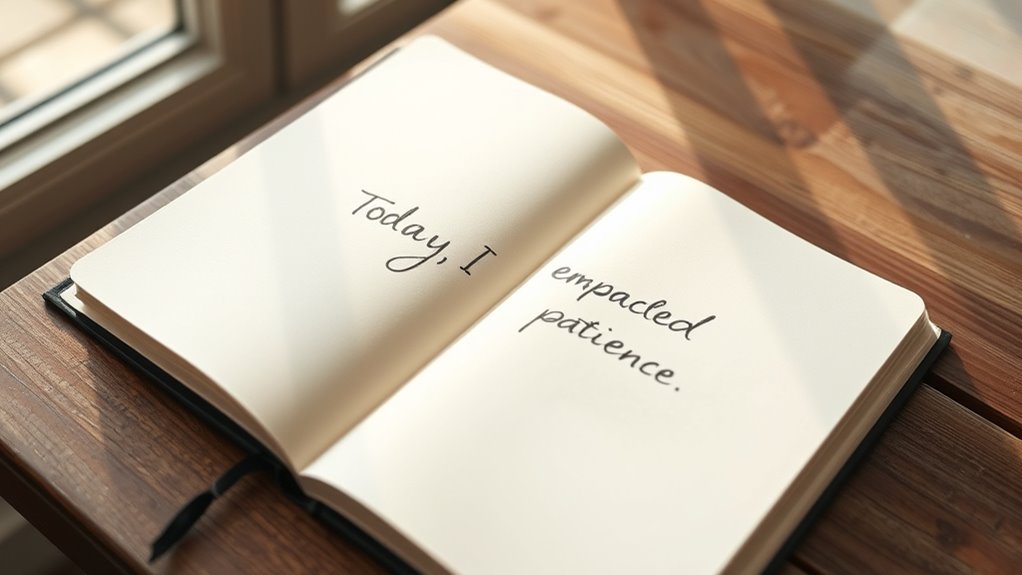A one-sentence journal entry can substantially boost your self-awareness and mindfulness by encouraging honest, focused reflection without pressure. It helps you cut through mental clutter, capture key moments or feelings clearly, and build consistency in your practice. By embracing simplicity, you’ll find it easier to connect with your emotions and recognize patterns over time. If you want to explore how this minimal approach can transform your reflection habits, there’s more to discover below.
Key Takeaways
- Captures focused insights and emotional moments efficiently, fostering clarity and mindfulness in daily reflection.
- Promotes consistency and habit formation by reducing journaling to a simple, accessible practice.
- Enhances self-awareness and emotional regulation through honest, concise self-expression.
- Supports mental clarity by decluttering thoughts and recognizing patterns over time.
- Serves as a foundation for deeper reflection and growth, encouraging natural progression from brief to detailed entries.
The Origins and Philosophy Behind One-Sentence Journaling

The idea behind one-sentence journaling stems from a desire to simplify self-reflection and make regular writing more accessible. Rooted in mindful reflection, this practice encourages you to capture your thoughts quickly, focusing on clarity rather than length. It aligns with minimalist philosophy, which values simplicity and intentionality in daily habits. By distilling your feelings or insights into a single sentence, you remove the pressure of elaborate entries and foster consistent journaling. This approach emphasizes quality over quantity, helping you stay present and aware without feeling overwhelmed. Over time, it cultivates a habit of mindful awareness, allowing you to observe your growth and emotions with clarity and ease. Additionally, it can serve as a form of self-therapy, promoting emotional release and mental clarity in a manageable way. This simplicity fosters a more genuine connection with yourself.
Benefits of Keeping a Single-Sentence Journal

Keeping a single-sentence journal offers numerous benefits that can enhance your daily self-awareness. One key advantage is the mindfulness benefits, as it encourages you to pause and reflect on your thoughts or feelings in the moment. This practice helps you stay present and focused, fostering a deeper connection with your inner experiences. Additionally, it boosts emotional awareness by prompting you to identify and acknowledge your emotions succinctly. Over time, this habit sharpens your ability to recognize patterns in your mood and reactions, supporting emotional regulation. The simplicity of a one-sentence entry makes journaling accessible and less intimidating, ensuring consistency. Moreover, engaging in regular reflection through brief entries can support mental clarity by reducing brain fog and promoting cognitive health. Ultimately, this practice cultivates a clearer understanding of yourself, empowering you to navigate daily challenges with greater clarity and emotional resilience.
How to Craft Impactful One-Sentence Entries

To craft impactful one-sentence journal entries, focus on capturing a specific moment, emotion, or insight with clarity and honesty. Use mindful reflection to identify what truly resonated with you, and aim for emotional insight that reveals your inner state. Keep your sentences concise yet meaningful, emphasizing authenticity over perfection. Consider these tips:
Capture a moment or feeling with honesty and clarity to create impactful one-sentence journal entries.
- Focus on a single, vivid detail to anchor your entry
- Use active language to bring your reflection to life
- Ask yourself what feeling or realization stood out that day
- Be honest about your emotions, even if they’re complex or uncomfortable
- Incorporate self-awareness to deepen your understanding of your reactions and experiences
Incorporating a One-Sentence Journal Into Your Daily Routine

To make your one-sentence journal effective, pick a consistent time each day to write your entry. Focus on capturing key moments that truly matter, rather than trying to record everything. This routine helps you stay engaged and makes journaling a seamless part of your day. Incorporating techniques like color accuracy understanding can also deepen your appreciation of visual details in your daily observations.
Establish a Consistent Schedule
Establishing a consistent schedule is essential for making your one-sentence journal a daily habit. When you allocate a specific time each day, habit formation becomes easier, and it helps you stay committed. Good time management guarantees journaling doesn’t fall by the wayside. To keep it simple, try these tips:
- Pick a time when you’re least likely to forget, like morning coffee or bedtime.
- Set a reminder or alarm to prompt you.
- Keep your journal in a visible spot.
- Make it part of an existing routine, like after brushing your teeth.
- Incorporating a moment for reflection can also enhance your mental well-being and deepen your journaling practice.
Focus on Key Moments
Focusing on key moments helps you seamlessly incorporate your one-sentence journal into your daily routine. By identifying meaningful experiences, you strengthen your mindfulness practice and gain emotional insight. Capture these moments as they happen to deepen self-awareness and reflection. Use the table below to prioritize and recognize significant events:
| Moment Type | Example | Reflection Focus |
|---|---|---|
| Personal Achievement | Completing a project | Emotional response and growth |
| Interpersonal Moment | Heartfelt conversation | Feelings and insights gained |
| Challenge Encounter | Difficult task at work | Emotions experienced |
| Serene Moment | Quiet morning meditation | Mindfulness and gratitude |
| Unexpected Surprise | Spontaneous act of kindness | Emotional insight and connection |
Focusing on these moments helps make your journaling purposeful and impactful, especially when you consider how educational toys can foster emotional intelligence and critical thinking skills through play.
Examples of Powerful One-Sentence Reflections

Some of the most impactful one-sentence journal reflections capture a moment of clarity, emotion, or insight in just a few words. These powerful entries often serve as mindful reflections that deepen your understanding of yourself. For example, you might write, “Today, I realized my anxiety diminishes when I pause and breathe,” revealing emotional insight. Or, “I felt overwhelming gratitude when I saw my child smile,” capturing a meaningful moment. Other examples include:
A single sentence can reveal a moment of insight, emotion, or growth that deepens your self-awareness.
- “Instead of rushing, I chose to listen fully to my friend.”
- “My frustration faded after recognizing it was rooted in fear.”
- “I noticed my body relaxing as I let go of perfection.”
- “Today, I acknowledged my progress, no matter how small.”
- “Choosing a dog name that reflects my personality helped me feel more connected to my pet.”
Overcoming Challenges in Maintaining Simplicity

While capturing simple, meaningful journal entries can be powerful, maintaining that clarity over time often presents challenges. It’s easy to drift into overcomplicating your reflections or losing focus on mindful simplicity. To overcome this, you need consistent journaling discipline, making it a daily habit rather than a chore. Resist the temptation to overanalyze or add unnecessary detail; instead, focus on capturing the essence of your feelings or insights in one clear sentence. When you stay committed to this discipline, you strengthen your ability to keep entries concise and impactful. Remember, the goal isn’t perfection but consistency. Over time, this mindful simplicity becomes a natural part of your routine, helping you stay grounded and focused amidst life’s distractions. Incorporating mindfulness techniques, such as deep breathing or visualization, can further enhance your ability to remain present and clear in your reflections.
Enhancing Self-Awareness and Clarity Through Minimalism

Minimalism in journaling sharpens your self-awareness and clarifies your thoughts by stripping away unnecessary details. When you focus on a single sentence, you create space for honest reflection and insight. This simplicity encourages mindfulness meditation, helping you stay present and attentive to your emotions. It also enhances emotional regulation by revealing patterns and triggers without overwhelming you. Incorporating nutritional balance into your routine can further support mental clarity and overall well-being.
Consider these benefits:
- Quickly identify what’s truly important
- Reduce mental clutter for better focus
- Cultivate a non-judgmental awareness of feelings
- Make daily reflection more accessible and sustainable
Expanding Your Practice: When and How to Go Beyond One Sentence

As you become more comfortable with writing single-sentence journal entries, you might find that your reflections naturally deepen and expand over time. When that happens, it’s a good signal to explore beyond one sentence. Use reflection techniques like journaling prompts to guide your growth. Consider adding a few sentences to clarify your thoughts or explore new insights. To visualize this, here’s a simple example:
| Reflection Stage | Description |
|---|---|
| One sentence | Brief insight or feeling |
| Slight expansion | Add context or reason |
| Deepening | Explore emotions or connections |
| Reflection prompt | Ask yourself a guiding question |
| Full entry | Write freely, integrating ideas |
This approach helps you evolve your journaling practice thoughtfully and purposefully, fostering a mindful decluttering of your thoughts and feelings.
Frequently Asked Questions
Can One-Sentence Journaling Replace Traditional Journaling Methods?
Imagine capturing a fleeting moment in a snapshot—one sentence can do that for your thoughts. While brevity benefits your journaling habits by making it easier to stay consistent, it might not fully replace traditional methods. One-sentence journaling sparks quick reflection, but longer entries allow deeper exploration. You can blend both, using brevity benefits to maintain the habit, while traditional journaling offers richer insights when needed.
What Are Common Mistakes to Avoid With One-Sentence Entries?
When using one-sentence entries, avoid overgeneralizing by making broad statements that lack specifics. Don’t neglect details; your sentence should capture key emotions or insights to be meaningful. Steer clear of vague language or overly complex sentences that can dilute your message. Keep it concise but descriptive enough to reflect your true feelings or thoughts. This way, your journal remains impactful and helps you track genuine progress over time.
How Can One-Sentence Journaling Improve Mental Health?
You can improve your mental health by using one-sentence journaling to boost emotional regulation and self-awareness. By regularly capturing your thoughts concisely, you identify patterns, recognize triggers, and process feelings better. This practice helps you stay present, reduces stress, and fosters clarity. When you commit to simple, honest reflections, you develop a deeper understanding of yourself, making it easier to manage emotions and build resilience over time.
Is One-Sentence Journaling Suitable for All Personality Types?
They say, “Different strokes for different folks,” and that’s true for journaling. One-sentence journaling can suit many personality types, but its adaptability depends on your needs. If you’re introspective, it might help you focus; if you’re more expressive, longer entries could suit you better. So, consider your personality compatibility and try it out—this method’s flexibility allows you to tailor your journaling to fit your style perfectly.
How Do I Stay Motivated to Keep My Entries Concise?
To stay motivated to keep your entries concise, try using motivation strategies like setting a daily reminder or rewarding yourself after consistent entries. Focus on entry consistency by making it a habit, which naturally encourages brevity. Remind yourself of the benefits, such as clarity or stress relief, and keep your goals realistic. These approaches help you stay committed and make concise journaling an easy, rewarding part of your routine.
Conclusion
By embracing the simplicity of a one-sentence journal, you foster clarity, cultivate self-awareness, and build consistency. You strengthen your reflection, deepen your insight, and inspire your growth—all through the power of a single sentence. You make journaling accessible, meaningful, and sustainable. So, keep it brief, keep it honest, and keep it going. Because when you focus on one sentence, you release a world of understanding, progress, and transformation.









